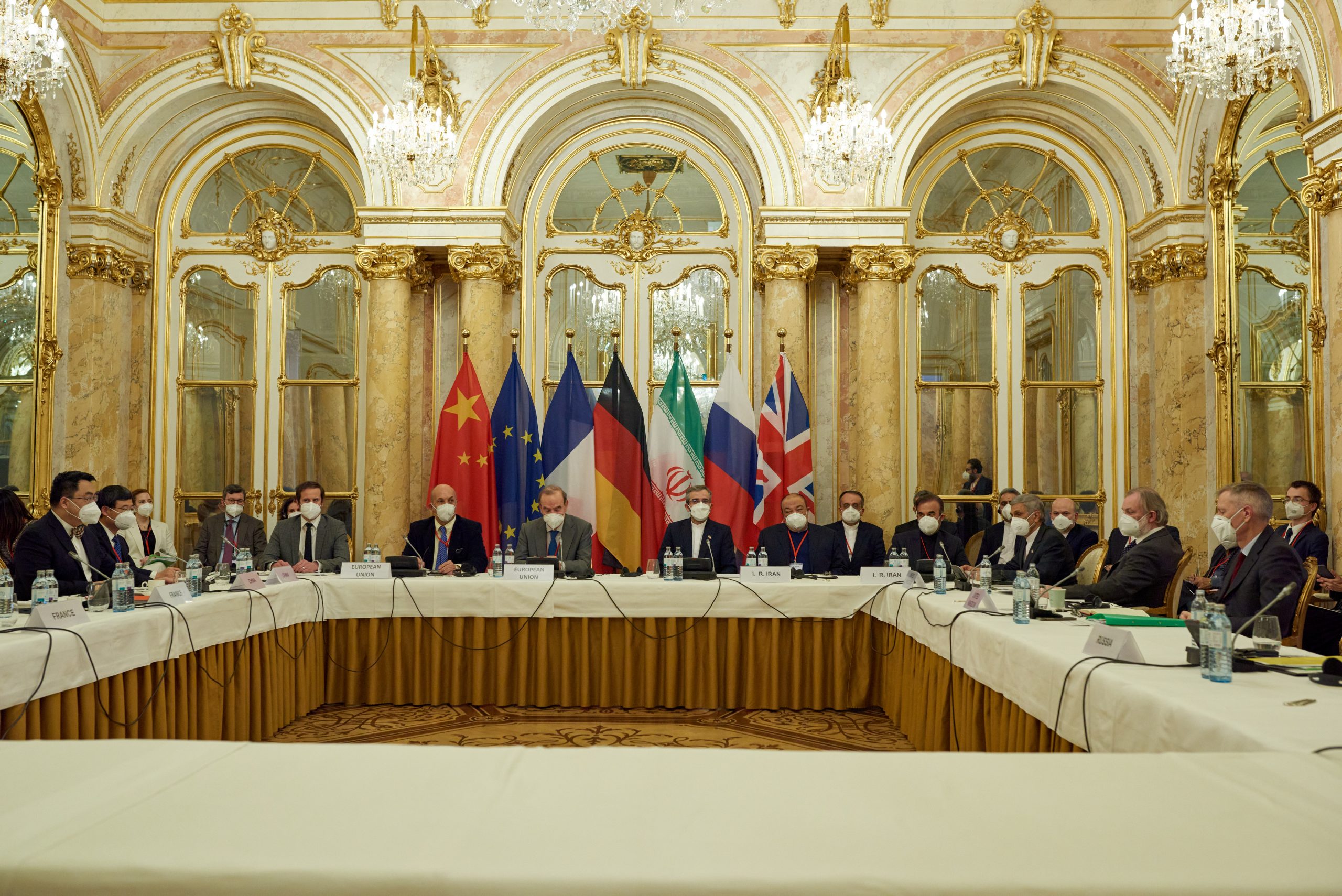The Regional Arena: Friction and Divides alongside Detente and Cooperation
Eldad Shavit, Ofir Winter, Yoel Guzansky, Oded Eran, Gallia Lindenstrauss, Remi Daniel, Yaron Schneider, Yoram Schweitzer, and Kobi Michael
Trends
Regional detente and pursuit of cooperation · Less US involvement in the region · The impacts of climate change and the global economic crisis are evident · Improved economic relations between the region’s countries and Israel
The Regional Arena: Friction and Divides alongside Detente and Cooperation
Eldad Shavit, Ofir Winter, Yoel Guzansky, Oded Eran, Gallia Lindenstrauss, Remi Daniel, Yaron Schneider, Yoram Schweitzer, and Kobi Michael
Recommendations
Regional changes offer Israel opportunities to leverage its assets · Expand the security dialogue on Iran, without conditioning it on increased cooperation · Focus the dialogue on issues central to the global agenda, particularly climate
The main trend in the Middle East arena is regional detente. Following the competition for hegemony between the various camps (Shiite, Sunni pragmatic, the Muslim Brotherhood, and jihadist) that dominated events in recent years, the patterns in the Middle East shifted in 2021. Especially prominent was a tendency absent in the region for many years in favor of cooperation, departing from the reigning divisiveness. Saudi Arabia and Iran are engaged in dialogue, in part through the mediation of Iraq; the United Arab Emirates terminated its involvement in the wars in Yemen and Libya, and improved its relations with Iran, Syria, and Turkey; after three years of boycott, the dispute between Qatar on one side and the UAE, Saudi Arabia, Bahrain, and Egypt on the other has ended; Jordan is engaged in dialogue with Iran and Syrian President Bashar al-Assad; and Turkey has shown interest in improving its relations with the UAE, Egypt, Saudi Arabia, and Israel. Furthermore, the UAE and Bahrain cultivated their public ties with Israel in the framework of the Abraham Accords, while Egypt seemed intent on strengthening its economic relations with Israel, and is working with Jordan to solve the energy crisis in Lebanon. Israel should give thorough consideration to the significance of the new regional dynamics, and take advantage of the emerging regional openness to expand relations that began in the framework of the Abraham Accords and forge relations with additional countries.
Principal Influences
Scaled back United States involvement in the region: The chief catalyst behind the regional detente is the understanding that the United States is realizing the policy pursued by recent presidents, and translating the change in its priorities and the need to focus on China into concrete measures. The US withdrawal from Afghanistan constituted decisive proof for Middle East countries that President Joe Biden is implementing a policy of United States withdrawal from “unnecessary wars,” and does not intend to invest attention and resources in conflicts that are not part of the core American interest. It is clear that leaders in the region are now aware that even if they still rely on the Unites States, they must regroup – preferably in mutual cooperation – in order to deal on their own with external and internal challenges.
The change in American policy affects the perception of the Iranian threat. Countries of the region have considered a possible return by Iran and the United States to the nuclear agreement, or alternatively, that negotiations may collapse, and Iran will continue developing its nuclear capabilities. Furthermore, given the assessment that the US administration will not defend the interests of its allies in the Middle East, these countries find it increasingly necessary, very likely with encouragement from the United States, to consider whether a friendly dialogue with Iran could alleviate tensions with Tehran, even if it is still premature to predict whether the talks with Iran will help resolve longstanding disputes.

Cooperation between the Sunni countries, despite the disputes between them, is likely to improve their ability to confront the challenges posed by Iran. The rapprochement between countries in the Islamist camp and the pragmatic camp can also be viewed in light of the erosion over the past year in the power of political Islam as an alternative to the prevailing regional order, following a growing split in the Egyptian Muslim Brotherhood movement and the electoral failure of the Islamist political parties in Tunisia and Morocco.
Economic-climate influences: The region is increasingly aware that coping with economic and environmental challenges requires expanded cooperation. Population growth; rising unemployment, especially among the younger generation; and the effects of climate change play a key role. The failure of certain countries, headed by Lebanon, and to a certain extent Iraq, underscores the need to build capabilities that will help countries handle environmental catastrophes, such as drought, which are projected to increase in the coming years.

The change in US policy affects the perception of the Iranian threat. Vienna talks between Iran and the world powers
Photo: EU Delegation in Vienna/Handout via REUTERS
State-by-State Review
Lebanon, Syria, and Iran are discussed elsewhere in the Strategic Survey.
Egypt
Egyptian foreign policy in 2021 was influenced by several factors. The first was enhancement of its image as an asset to the Biden administration, highlighted by Egyptian mediation and involvement in the process of reaching an arrangement and reconstruction in the Gaza Strip; actions aimed at stabilizing the situations in Libya, Sudan, and Lebanon; and participation in efforts to deal with the global climate and energy crises. These measures were intended to convince Washington to take Egypt’s side in the crisis with Ethiopia over the Grand Ethiopian Renaissance Dam, and to soften the US administration’s criticism of Egypt on human rights matters. The second was the subsiding of the disputes between Egypt on the one hand and Turkey and Qatar on the other, with Cairo and Doha exchanging ambassadors. The third was promotion of regional economic cooperation, including the “New Levant” alliance with Jordan and Iraq, which focuses on development in economics, transportation, and energy, with the aim of possibly expanding it to Lebanon and Syria.
Cairo’s agenda had a positive effect on its ties with Israel and their public visibility. The rapprochement between both countries was evident in the September summit meeting between President Abdel Fattah el-Sisi and Prime Minister Naftali Bennett in Sharm al-Sheikh during the first public visit to Egypt by an Israeli prime minister in a decade, and in visits by ministers on both sides (ministers of foreign affairs, intelligence, and energy). These were designed to promote relations between the two countries in matters pertaining to natural gas, trade, tourism, and civil aviation. Furthermore, Israel and Egypt agreed to revise the military appendix to their 1979 peace treaty in order to allow Egypt to station permanent border police forces in Rafah.

Israel and Egypt drawing closer. Prime Minister Bennett and President el-Sisi in Sharm el-Sheikh
Photo: Kobi Gideon, GPO
Jordan
Internal criticism of the regime has increased over the past year. Incidents, including the “conspiracy” by Prince Hamzah against King Abdullah, his half-brother; a personal attack on the king in parliament; and the exposure of the king’s wealth, bore a personal character, but criticism also extended to the government’s failure in handling the COVID-19 pandemic and its economic consequences and the proposed reform in the electoral system, which the tribes perceive as aimed at reducing their power. Jordan’s economic situation is extremely alarming. Even before new waves of COVID-19, international institutions forecast economic growth in the country of less than 2 percent in 2022. The water shortage will continue, and is liable to aggravate the criticism of the government (which will almost certainly seek to renew the memorandum of understanding with Israel in this context as soon as possible).
In foreign affairs, King Abdullah will continue to pursue all paths, i.e., adhere to high-profile coordination with the Palestinians, including an effort to institutionalize relations with the Gaza Strip, while at the same time maintaining constructive cooperation with Israel, strengthening political and economic cooperation with Iraq and Egypt, and continuing the dialogue with Bashar al-Assad in Syria and Iran that he began in 2021. The strategic dialogue at the highest political level between Israel and Jordan is essential, in order to cement an understanding of Jordan’s needs and attempt to include it in positive initiatives toward the Palestinians, and to reduce the official and public internal criticism of Israel, which fans hostile activity against Israel in Jerusalem, as well as in the West Bank.
Saudi Arabia and the Gulf States
The Gulf states continue to be a regional economic and political hub enjoying relative stability. Last year featured a turn toward the Biden administration and an effort to win points in Washington in a variety of ways, including the environmental issue. From the perspective of the Gulf states, the United States is actively seeking to reduce its involvement in the Middle East. Strategic hedging with China and Russia therefore continued, including in aspects liable to challenge Israel.

From the perspective of the Gulf states, the possibility that the major powers and Iran will sign an agreement in 2022 requires preparation for a regional diplomatic effort to soothe tensions, focusing on a dialogue with Iran, even though the reasons for the hostility between the two sides remain. The fear of a stronger Iran and its emergence as a nuclear threshold state on the one hand – with or without an agreement – and the disengagement of the United States from the region on the other are liable to induce Riyadh to consider the nuclear option. A further rise in oil prices will make it possible to relieve the economic burden in those countries in 2022, and provide foreign aid elsewhere.
The normalization between the United Arab Emirates and Bahrain with Israel extends beyond the economic and trade sphere Challenges remain, however, among them the Palestinian issue and relations with Iran. Saudi Arabia, which is sensitive to public disclosure of its relations with Israel, continues to accustom its public to the possibility of greater openness toward Israel. The improvement in the global standing of Crown Prince Mohammed bin Salman is expected to continue in 2022, although there is still internal opposition to his rule. His control over all of the security agencies will help him suppress opposition, and perhaps also to rule as king even before his father’s death. He is expected to show greater pragmatism on the question of relations with Israel.
Iraq
The most significant development in Iraq in 2021 was the upset in the parliamentary elections: the defeat of the pro-Iranian candidates (who lost two thirds of their power in parliament). The pro-Iranian militias refused to accept the defeat, and the result was escalation in the internal crisis between the militias and the government in Baghdad. This was reflected in violent clashes between the militias’ supporters and the security agencies, and an attempted assassination (using explosive drones) of Iraqi Prime Minister Mustafa al-Kadhimi, who has taken action to halt the militias’ activity since he took office. Following the assassination attempt, the Iranian regime took strong action to restrain the militias operating under its patronage, and intervene in the negotiations for assembling the new coalition. Two years after the wave of protest against Iranian intervention in Iraq began, Tehran’s ability to dictate what happens in Baghdad is in doubt. For its part, the US administration has no desire to become involved in shaping the situation in Iraq and wants to divest itself of any direct involvement, an assessment compounded by the negative impression left by the hasty American withdrawal from Afghanistan.

US distance from the region may encourage Saudi Arabia to pursue a nuclear option. Saudi Crown Prince Mohammed bin Salman
Photo: Bandar Al Jaloud – Royal Palace / ABACAPRESS.COM
Turkey
The leading developments in Turkey in 2021 were primarily in the internal arena, in particular the sharp depreciation of the Turkish lira, which increased inflation. The government’s opposition to formal interest rate hikes exacerbates the economic problems, which in turn has caused a decline in support for President Recep Tayyip Erdogan and his Justice and Development Party. Consequently, his ability and that of his party’s bloc to win the presidential and parliamentary elections scheduled for 2023 are in doubt. While 2020 featured an assertive foreign policy by Ankara, 2021 saw noticeable efforts to improve relations with a number of countries in the region, among them the United Arab Emirates, Egypt, Saudi Arabia, and Israel. Turkey’s drive to normalize its relations with countries in the region is attributed to the effort to escape its isolation and weaken the opposing axis that arose in response to the government’s provocative policy, and to Turkey’s growing need for foreign investment – a result of the country’s declining economic situation.
The signals from Ankara to Jerusalem about improved relations continued, together with absolute support for Palestinian views. The most objectionable element for Israel is Turkish support for Hamas and the permission to the organization to orchestrate logistic and military activity on Turkish soil. Given the makeup of Israel’s current government, however, it is doubtful whether it can promote an initiative in the Palestinian context that would be sufficient for the Turks. A return to negotiations with the Palestinians, should it occur, could help move Israeli-Turkish relations in a more positive direction.
Non-State Organizations
The decline in activity by ISIS, al-Qaeda, and their affiliates since the military defeat of the Islamic State in 2019 continued in 2021. The most significant event, which is expected to influence terrorism in the coming years, was the US military withdrawal from Afghanistan. It is unclear whether Afghanistan will resume its role as a training base for the export of terrorism to countries in the region and the West, or whether the Taliban has learned from the severe blow dealt to it by the United States in late 2001, and will no longer allow such activity.

Will Afghanistan continue to be a training basis for terror? Taliban operatives after takeover of Afghanistan
Photo: REUTERS/Stringer
Policy Recommendations
The Middle East of 2022 will continue to feature unstable regimes confronted with fundamental problems (economics, demography) and an unemployed and frustrated young population (exacerbated, inter alia, by the discourse on social media) oppressed by governmental tyranny. The challenge posed by global jihad and radicalism to countries in the region, Iran’s progress in its nuclear program and its regional subversion, and the loss of confidence created by the perceived United States exit from the region are all destabilizing elements.
These problems, together with familiar conflicts between rival camps (Shiites against Sunnis, for example), have altered the nature of the discourse and conduct of the actors in the region. 2022 has the potential to be a year in which the changed regional dynamic takes root. Even if the basic hostility between the various camps remains, the changes in the global theater, headed by Biden’s presidency, combined with domestic dangers, dictate a different agenda than in the past. At the same time, caution and more time are needed to determine where the region is headed, and to test to what extent unanticipated developments will affect the emerging trends in the region.
The fundamental problems and the changes in the regional architecture give Israel an opportunity, not to mention a growing need, to deepen its regional involvement, and to strengthen its influence in order to advance its security. Israel can leverage its relative advantages in science and technology, as well as its proactive image and its status in the United States. Israel should take advantage of the dynamics of regional openness in the past year to expand the relations developed in the framework of the Abraham Accords, and initiate additional relations. Supplementary to closer economic relations, the dialogue with these countries must focus on furthering cooperation in matters at the heart of the global agenda, with an emphasis on water, environment, and energy, both through governmental channels and with non-governmental entities. Cooperation in regional frameworks, based on the Abraham Accords and beyond, should be promoted, for example, the East Mediterranean Gas Forum (EMGF), as well as in the Union for the Mediterranean (UfM), in which Israel has not invested resources in recent years, despite its involvement in aspects that are at the heart of the global agenda. Israel and its friends in the region should continue their security dialogue in the context of Iran, but without making other fields of cooperation and dialogue contingent on this aspect.
Israel must keep close track of developments and the possibility of negative changes in the Afghan theater and the activities of ISIS and other groups wherever ISIS, al-Qaeda, and their affiliates are active, with an emphasis on Africa. In this context, Israel should continue leveraging its capabilities in intelligence and preemptive action against global jihad infrastructure and organization to extend its relations with countries in the region and worldwide.
Special attention should be invested to continue the positive trend that emerged in 2021 in relations between Israel and the pioneers of peace: Egypt and Jordan. The positive change in the circumstances and regional priorities are likely to enable the parties to promote ventures that would previously have encountered formidable obstacles. In the Palestinian aspect, an effort should be made to achieve understandings with Egypt and Jordan on the containment of Hamas and strengthening of the Palestinian Authority.


